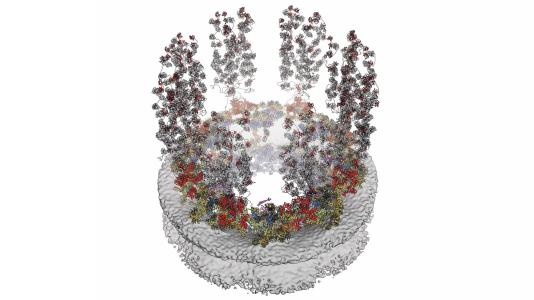
One of the most intricate parts of the human cell is the nuclear pore complex, which serves as a discriminating gatekeeper to the cell’s nucleus. Understanding how it works could have major implications for research into diseases and other conditions. Scientists spent 20 years using the powerful X-rays of the Advanced Photon Source (APS) at Argonne National Laboratory to create a map of the nuclear pore complex, atom by atom.
Not only is the nuclear pore complex (NPC) central to the operations of the cell, it is also involved in a variety of diseases. Mutations in the NPC are responsible for some incurable cancers, neurodegenerative and autoimmune diseases, such as amyotrophic lateral sclerosis (better known as Lou Gehrig’s disease, or ALS), and heart conditions including atrial fibrillation and early sudden cardiac death. Additionally, many viruses, including the one responsible for COVID-19, target and shut down the NPC during the course of their lifecycles.
Researchers’ new map of the NPC gives us tremendous insight into the makeup and function of this important cellular mechanism. Much of the work to create this map was done at the Advanced Photon Source (APS), a U.S. Department of Energy(DOE) Office of Science user facility at DOE’s Argonne National Laboratory. The ultrabright X-rays of the APS illuminated the structure of the atoms that make up each of the proteins that make up the NPC.
Argonne National Laboratory seeks solutions to pressing national problems in science and technology. The nation’s first national laboratory, Argonne conducts leading-edge basic and applied scientific research in virtually every scientific discipline. Argonne researchers work closely with researchers from hundreds of companies, universities, and federal, state and municipal agencies to help them solve their specific problems, advance America’s scientific leadership and prepare the nation for a better future. With employees from more than 60 nations, Argonne is managed by UChicago Argonne, LLC for the U.S. Department of Energy’s Office of Science.
The U.S. Department of Energy’s Office of Science is the single largest supporter of basic research in the physical sciences in the United States and is working to address some of the most pressing challenges of our time. For more information, visit https://energy.gov/science.